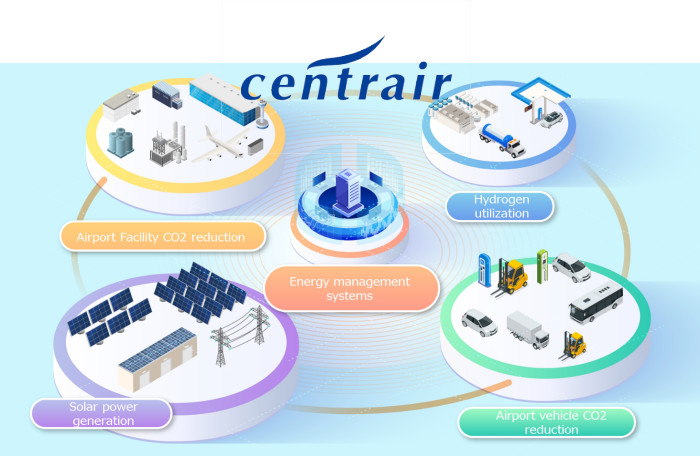Central Japan International Airport and Toyota Tsusho Sign Partnership Agreement to Achieve Zero Carbon
- Japan's first partnership between airport management and a private corporation to achieve zero carbon at an airport -
- (former)Machinery, Energy & Project
2022-04-13
Central Japan International Airport Co., Ltd. ("CJIAC", ) and Toyota Tsusho Corporation ("Toyota Tsusho") signed a partnership agreement on March 31, 2022 to develop a plan and a concrete business scheme to achieve zero carbon* at Chubu Centrair International Airport("Centrair").
This initiative, in which airport management and a private corporation sign a partnership agreement, develop an "Airport Decarbonization Promotion Plan" and promote Zero carbon※ at an airport, is the first initiative of its kind in Japan.
Toyota Tsusho will also collaborate with Japan Environment Systems Co., Ltd., Obayashi Corporation and Toho Gas Co., Ltd.
Partnership targets
- An “Airport Decarbonization Promotion Plan” will be developed and zero carbon at the airport will be promoted through the partnership between CJIAC and Toyota Tsusho. The plan will be based on the five axes of making a renewable energy hub, reducing CO2 emissions from airport facilities, reducing CO2 emissions from airport vehicles, utilizing hydrogen and introducing of new energy management at Centrair, while taking into account the perspectives of cooperation with the region and the strengthening of resilience.
- The initiative aims to develop a concrete business scheme to achieve the plan while utilizing Toyota Tsusho’s one-stop decarbonization solutions and create a zero-carbon model for the airport that only CJIAC and Toyota Tsusho can provide.
By promoting zero carbon initiatives, CJIAC and Toyota Tsusho will contribute to the transition to a decarbonized society by developing the “skies of the future” that will continue from Centrair to the rest of the world.
*Zero carbon is the reduction to net zero of overall greenhouse gas emissions such as CO2(synonymous with carbon neutrality)
Five axes of achieving zero carbon at Centrair
Background on Initiative
In October 2020, Japan declared that it would aim to reduce overall greenhouse gas emissions to net zero and realize carbon neutrality by 2050. In addition, in April of last year, Japan announced that it would set its reduction target for FY2030 at 46% below the FY2013 level and continue to take on the challenge of achieving a further 50% reduction at the Leaders’ Summit on Climate hosted by the United States.
In March of last year, the Ministry of Land, Infrastructure, Transport and Tourism established the “Investigative Commission on CO2 Reduction in the Airport Sector” to investigate aspects such as the conversion of airports into renewable energy hubs and measures to reduce CO2 emissions from airport facilities and vehicles. At the fourth meeting of the investigative commission held in February of this year, the “Policy on Initiatives for Airport Decarbonization” was presented. This policy states that Japan will contribute to the realization of a decarbonized society through the proactive implementation of initiatives to decarbonize airports, and that Japan will aim for its airports to become the airports of choice in the world. In addition, initiatives for zero carbon at airports are accelerating, such as cabinet approval of the “Bill for Partial Amendment of the Civil Aeronautics Act, etc.” on March 1 of this year, which includes the “Airport Decarbonization Promotion Plan” created by airport management and approved by the Minister of Land, Infrastructure, Transport and Tourism.
CJIAC has aimed to be an environmentally friendly airport since it first opened and has been working on reducing its environmental impact such as by installing a solar power system in the terminal building, introducing a cogeneration system and utilizing hydrogen energy. In May of last year, CJIAC declared “Centrair Zero Carbon 2050,” which “aims to reduce the CO2 emissions from airport facilities to net zero by 2050 and make an effort to achieve the national greenhouse gas reduction target of a 46% reduction compared to FY2013.”
Toyota Tsusho is actively promoting businesses related to carbon neutrality, including the renewable energy business, which is a strength of the Group, as well as the decarbonization of harbors using hydrogen and energy management using storage batteries. Toyota Tsusho also has expertise in airport operations in Japan and overseas.
Overview of Central Japan International Airport
|
Company name
|
Central Japan International Airport Co., Ltd. |
|---|---|
|
Location
|
Tokoname City, Aichi Prefecture |
|
Established
|
May 1, 1998 |
|
Representative
|
President & CEO Riki Inuzuka |
|
Business description
|
1. Establishment and administration of Central Japan International Airport and air safety facilities 2.Construction and administration of functional facilities, including passenger and cargo handling facilities, and of convenience facilities such as shops 3.Operations incidental to those given above |
Overview of Toyota Tsusho Corporation
|
Company name
|
Toyota Tsusho Corporation |
|---|---|
|
Location
|
Nagoya City, Aichi Prefecture |
|
Established
|
July 1, 1948 |
|
Representative
|
President & CEO Ichiro Kashitani |
|
Business description
|
Domestic and international trade of goods, export and import of goods, construction undertaking, insurance agents, among others |
The information in this release is current as of the date of announcement.
Please note that information may change after the date of announcement. Thank you in advance for your understanding.



